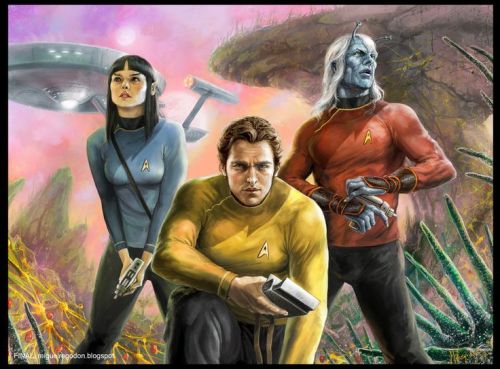

The characters roll, usually against the base initiative Tricode of 4/6/8, with the same roll being read two different ways to determine both the order of action (determined by overall number of successes, which aren't counted for other roll types), and how many/what type of actions each character can do in their turn (determined by Success Level). Initiative is a little hard to grok at first. Each weapon has a maximum damage capacity, and the Success Level decides how much of it is applied. In combat situations, the same roll determines both the success of a given attack, and its damage. There are also rules for failures and "botches", of course. 6's explode, and are re-rolled, with the new roll -1 being added to the first roll of 6. The highest number rolled out of the dice in the pool is the one that counts. Every action has a "Tricode", or 3 ascending target numbers (e.g., 4/6/8 for minimal/moderate/complete success). Prime Directive uses pools of 6-sided dice, the number of which is determined by stat and/or skill. But aside from the trappings of Trek, the game has a unique RPG system underneath the hood. The game was designed from the ground up to simulate the tropes of the TV show, despite being far more combat-oriented. Garnish with smooth-headed Klingons, and voilá! The result is a very militaristic take on the original Star Trek universe. So, take The Original Series, add The Animated Series, then add a dozen wars, season with a dash of Niven, and blend. See, it's set in the universe of the Star Fleet Battles wargame. Too much Trek for non-Trek fans, not enough Trek for Trekkers. I get why this game might be off-putting to many. I have a thing for both little-known systems and non-canon stuff (be it Star Trek, Star Wars, or comics), and this ticks both boxes. I got it stupid cheap ($2.00 on clearance at Half Price Books). S John Ross' Unpublished Icon stuff: Untaken Treks: The Unpublished LUGtrek Work of S.Been reading the old Prime Directive RPG. Links that may be of interest for Star Trek RPGing: Usually we did that early in the session so that we could get on to the serious gaming.)

In every episode, Weseley Crusher got killed. (In one campaign, we did have one nod to another series. This didn't happen for every player, but most interested in playing, even those who were not huge ST fans, really enjoyed immersing themselves in ST-like challenges and solutions. One of the fascinating thing that I discovered running ST RPG sessions was the willingness of many players to accept the technobabble and solutions seen in the TV shows, even those not incredibly familiar with the series.


 0 kommentar(er)
0 kommentar(er)
